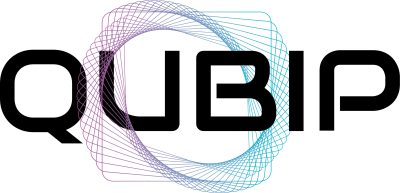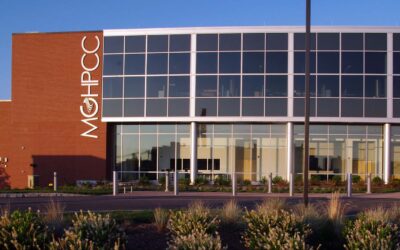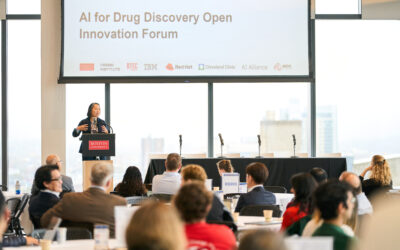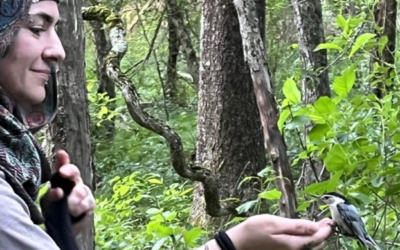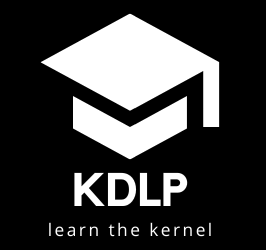At Red Hat Research, we hire creative, passionate students ready to work and learn with a global leader in open source solutions. Our interns bring fresh ideas and new connections to challenging problems in the open source community, unlocking their own potential while contributing to the innovative power of open development.
This blog post spotlights Maria Shevchuk, a senior pursuing a BS in Biomedical Engineering and a BA in Computer Science dual degree at Boston University. Maria has worked with Red Hat through student-funded opportunities associated with the Red Hat Collaboratory at Boston University and directly as a Red Hat intern. She spoke with us about her research with the Red Hat Collaboratory at Boston University, how she has leveraged her time at Red Hat to pursue her passions in healthcare and technology, making the most of an internship, and her take on the hot dog sandwich debate.
Check out Maria’s Red Hat Research People Profile to watch her intern presentation and video from the November 2022 Girls Who Code X Red Hat event and follow her on GitHub and LinkedIn.
What have you been working on during your time working with Red Hat?
In summer 2022, I worked on developing an application that leveraged MONAI (Medical Open Network for Artificial Intelligence) in RHODS (Red Hat Openshift Data Science). A principal aim of my project was to showcase app development capabilities within RHODS and highlight possible applications in the healthcare industry.
As of fall 2022, I have been working with the Open Source Programs Office (OSPO) on Project Aspen, developing a model to quantitatively describe open source project health. For this project, I am funded through the Red Hat Collaboratory program at BU, which is how I initially began working with Red Hat in 2021. As an international student, finding work opportunities during the school year aside from on-campus jobs can be hard, but the Collaboratory makes it possible.
I am also excited to share that I have accepted a Data Science internship position with OSPO for summer 2023, which I will be starting in May exactly one day after I officially graduate! Red Hat can’t seem to get rid of me and I couldn’t be happier about that!
What makes you interested in open source research?
It is no secret that open source research and projects benefit from faster development, cost-effectiveness, and more diverse contributors. However, I have a more personal appreciation for it. As someone who moved to this country primarily for its opportunities, I believe that open source opens so many doors for people who may otherwise not have access to technical skill development platforms, collaboration, and employment opportunities.
Corporations have gotten so caught up in the competition, trying tirelessly to be the best in their field, yet this mentality can often be the enemy of progress. I truly believe that with open source, we, as a collective, can be much better innovators, developers, and problem solvers.
What made you interested in working with Red Hat Research?
During the fall semester of my junior year, I worked on my first Red Hat Research project through the Red Hat Collaboratory at BU. I really enjoyed the combination of gentle guidance and freedom to define and find a solution to a problem in a certain area—in my case, user privacy. My team had the long-term goal of finding a way to defend networks against adversarial attacks, but first, we would need to better understand the learning process of a neural network. From this complex problem, I got to define my own project that would get us just a step closer to a solution. I chose to investigate the ways in which color can affect network accuracy (see my article on Medium for more). There was virtually no research that was even remotely related to what we were trying to accomplish and, oddly enough, I loved that. Working on a problem that no one else had an answer to felt exciting. I am now on my third Red Hat Research project and could not be more passionate and excited about the work that I am doing.
Share some details about your project. What is the purpose? Potential impacts?
Since I’ve worked on a few projects, I’ll focus here on Project Aspen, a group in Red Hat’s OSPO working on creating an open source community analysis toolset. The ultimate goal of this project is to give community managers, project contributors, and open source advocates data-driven insight into the health and behavior of open source projects in a novel, approachable, and extendable format.
My specific task focuses on developing a model to quantitatively describe project health. This may seem like an easy problem, but when it comes to an open source project, health is an abstract notion that could mean different things depending on the state and goals of the project. My job is to figure out what metrics factor into a project being healthy and whether a clustering algorithm can do a good job classifying a project into a level of health.
What knowledge, experience, or skills did you gain through your experience as an intern?
The knowledge I gained from my internship is quite different from what I expected to learn. I think a common misconception about software engineers is that all we do is code. During my internship, when I wasn’t coding I was busy doing research, meeting with my mentors, writing documentation for my project, and debating whether a hot dog is a sandwich. My technical skills did improve, but I also got better at public speaking, documenting my work, and overall became a better collaborator. I also learned a lot about open source projects, what makes them successful, and the community management required to keep a project running.
What I find truly exciting about Red Hat Research is the chance to tackle the most pioneering and cutting-edge challenges in technology, delving into uncharted territory and seeking solutions to questions that have never been explored before.
Who were your mentors? How have your project mentors helped you?
Throughout my time at Red Hat, I’ve had more mentors than I could reasonably talk about in my answer, all of whom have had a significant impact on me as a developer, collaborator, and person overall. I’ll focus on the mentors I had during my summer internship.
My technical mentor Guillaume Moutier was my main point of contact for the MONAI project. He was the reason I ended up doing a completely independent project, since he knew about my background in biomedical engineering and wanted to make sure I was working on something that could combine both of my passions—healthcare and tech. Guillaume and I had weekly meetings, and I left every single one with lots of new information and terms to Google. He used to say that when it came to this project, I was the expert, so he often learned from me, not the other way around. I guess you could say that was the one thing we didn’t agree on.
Audrey Reznik was my other technical mentor or, more specifically, I was her self-proclaimed mentee. Audrey’s work ethic and passion have always inspired me. She somehow manages to squeeze 40 hours of work into a 24-hour day, all while managing different projects and leading the Red Hat Women in Data Science group! I reached out to Audrey halfway through my internship, looking to get involved in one of the projects she was working on at the time, and almost as if she’d been waiting for my email, she had a job lined up for me.
Holly Valenty was my early talent mentor. During our biweekly meetings, Holly and I covered every possible topic of conversation, from our pets to our favorite workouts. When we weren’t sharing the details of our personal lives with each other, Holly helped me explore different career paths—like consulting and project management—that I found intriguing.
Last but certainly not least, Heidi Dempsey. As the Research Director, Heidi oversees the entire cohort of Red Hat Research interns and – oh my – is she brilliant. To this day, if I ever have any Red Hat related questions and am not sure who to turn to, Heidi is always the first person I contact and she never fails to prove to me that she is, in fact, omniscient!
What other things did you do with Red Hat or in the open source space during your time as a Red Hat Research intern?
Toward the end of my summer internship, I got to volunteer at DevConf.US 2022, an annual technology conference for community projects and professional contributors to free and open source technologies. This was an amazing experience where I got to listen to numerous brilliant speakers and network with Red Hatters from all over the country. At this conference, I was offered the opportunity to join the Project Aspen team, which has been a highlight of my senior year thus far.
More recently, I had the pleasure of hosting a Boston University Girls Who Code event in collaboration with Red Hat, where a panel of Red Hatters, all of whom I met during my time as an intern, shared their career advice and wisdom with our members.
What advice would you give to a new Red Hat intern?
Ask, Participate, Take Initiative, and Take Advantage! Let me elaborate:
- Ask: The best thing you can do for yourself if you are ever stuck on a problem is to ask for help. The worst possible outcome is that whoever you ask doesn’t know the answer to your question, and in that case, your confusion is validated—win-win!
- Participate: Any Red Hat discussion is an open table, and it is in your best interest to participate. I know it can be easy to feel inexperienced or as though your opinion is unimportant, but I promise you that is not the case here at Red Hat! You are here for a reason, and your input is just as valuable as any other employee, no matter how senior.
- Take initiative: When it comes to anything open source, it is your responsibility to explore and contribute to projects if you want to expand your portfolio. Most of the time, GitHub repositories will have open issues up for grabs. This is a great way not only to get your name out there as an open source contributor but also to explore different projects and expand your horizons. Same goes for joining interest-based communities, which there are a great deal of at Red Hat.
- Take advantage: – As an intern at Red Hat, you have access to a ton of resources, from Learning Paths to Certifications, that can be useful even if you end up leaving the company. Make sure you take advantage of that, as well as the networking opportunities.
Now for some fun questions—share a favorite memory from working at Red Hat Research.
Although I loved the freedom working remotely allowed, my favorite memories from my internship involved being at the Boston office. I loved exploring food places near the office for intern lunch, carpooling to and from work with fellow BU students, and trying every coffee machine at the office.
So back to the hot dog sandwich debate. Is a hot dog a sandwich? Why?
This is perhaps the most philosophical question our intern cohort had to debate this past summer. Unfortunately, after countless hours of research and scientific articles, the consensus does seem to support classifying a hot dog as a sandwich. However, I have chosen to ignore the research. NO, a hot dog is not a sandwich!
Dogs, cats, or other?
I love both, but my kitties Gin and Tonic wouldn’t forgive me if I didn’t say cats, so—cats!
What is your favorite travel destination?
As much as I would love to name a tropical paradise my favorite travel destination, the place I want to travel to most right now is my home country: Russia.
What are your talents or hobbies?
I am on the Boston University Water Polo team, and I absolutely love the sport. I’m lucky to have a group of friends who love trying new hobbies. Our latest favorites are squash, rock climbing, and escape rooms. I also enjoy the outdoors and long road trips with good music.

